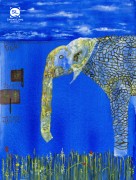Your story “The Least Fucked Up People” seems to be about self-awareness (or lack thereof) and how human beings measure themselves against others, how they fool themselves into believing they are “just fine” because they aren’t as fucked up as other people. Can you talk a little about your inspiration for this piece?
I know a lot of people who are in various stages of recovery, myself included, whether it’s from addiction, depression, or codependency, and many folks can’t quite kick their habits. Friends get lost in these illnesses because when you can’t get your mind right, it’s hard to see yourself clearly. Lots of denial. Sometimes the hardest thing, maybe the bravest thing you can do, is look within. Frank and the narrator are trying to work through their problems by deadening the symptoms. They can’t see the illness because it’s too deep.
A working title for this piece was “Grown-ass Men.” I’ve known a lot of grown-ass men who were their own worst enemies. Young people might not know any better, but older people sure as hell do. I don’t have an answer for how to help grown-ass men. They have to want to help themselves. I’ve got it in my head, though, that fiction can do wondrous things. In a story, you can remake the world. You can bring the dead back and talk to them.
I love what you’re saying here, “that fiction can do wondrous things.” By sharing what we’ve learned about life, we might shine a little light through our stories. How long have you been writing and publishing? What has been the most difficult thing to learn about the craft?
I’ve been writing for about a decade and a half, collecting so many rejections that I’ve grown tenacious and too dumb to quit. In the past few years, I’ve been fortunate to place pieces I’m proud of, in the journals I like to read, which feels pretty good.
The most difficult thing for me about the craft has been how to get to the heart, the emotional center of the story. Part of that means responding to the piece and figuring out what it needs to be. I still feel like a beginner every time I sit down to work on a new story. Each one has its own inner logic.
I love the way you talk about heart. Sometimes the emotional touchstone of a story gets lost in the mix, and while the writer senses something is wrong, he or she can’t figure out what it is. Who are the writers who have touched your heart?
Gay, this question is giving me a panic attack. I admire so many writers, I’m picking the first three that come to mind. I admire many writers even in other genres, like music. There’s this Leonard Cohen song where the voice of the song, instead of saying his children were born, says, “My son and my daughter climbed out of the water.” Holy shit that’s good! With one line, Cohen can make the known world strange and the strange world known.
A more recent find for me is Lucia Berlin. There’s a story in Manual for Cleaning Women set in a fishing village in Mexico. This scuba diver/fisherman is sitting at a table next to a couple changing a baby and it pees on the table. The diver wipes the pee off the table with his hand and runs it through his hair. That kind of characterizing action is exactly right for the story, because why would a man who makes his living diving into the ocean care about baby piss in his hair? Those moments fasten the reader into your story.
And Barry Hannah for his ability to hit all registers from the vulgar to the sublime. For that wild yearning voice. For teaching us how to howl.
Pretend you are holding a magic fountain pen and you could choose exactly what your future writing life would look like. What would you ask for? What kinds of books would you have in the window of the bookstore? What would your words say to the human condition? What would you hope to write about next?
If someone gave me a magic fountain pen I’d immediately lose it, but I’m hoping my future writing life includes lots of good people talking about why some stories aren’t working and why other ones are. It’s similar to my present writing life, but I’ve stepped up production and have more stories finished and out in the world.
My favorite books all say something about the human condition and do so by presenting characters as living, complicated humans on the page. I don’t know what exactly those books say about the human condition, but they’ve helped me feel less alone and more connected when so much in our existence works to make us feel separate from each other, disconnected from the earth, and even our own bodies. If I’m able to write books that help readers feel more human and rooted in their lives, anything close to what good stories, novels, songs, poems, and films have done for me, I’ll consider it a win.



 The SmokeLong Grand Micro Contest (The Mikey) is now an annual competition celebrating and compensating the best micro fiction and nonfiction online.
The SmokeLong Grand Micro Contest (The Mikey) is now an annual competition celebrating and compensating the best micro fiction and nonfiction online.